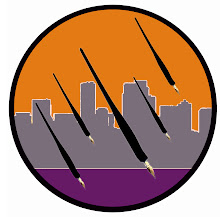As some of you may know, I’m
currently a Creative Writing grad student. In the last class I attended, the
focus (and indeed the title of the class) was “The Successful Story.”
The professor of this
class and my fellow students were all fabulous and throughout the course had
some great insights and commentary about what makes (or breaks) a good story. During
this class I also had the opportunity to read more than 80+ short stories—some
by established/published authors, some by fellow classmates, some by aspiring
writers hoping to get published—and discuss what strengths and/or concerns each
of those stories had.
 |
| Fist Full O' Short Stories |
One of the key learnings
for me from this class—and this quantity of short story reading—is that it is a
rare thing indeed for a story to be perfect, to not have a concern or
two, no matter how well written or thought out. Likewise, it is also rare to
have a story with absolutely no merit—that even if there are certain glaring
problems with a story—often there are good things going on in the writing as
well.
Another take-away for me is
that not all readers (or editors/publishers) have the same criteria for
what might make them love a story vs. hate it. For instance, for some readers
having grammatical problems in the prose is a “deal breaker.” For me, as a
reader, I’m not as concerned about that (and can forgive it to an extent), but
if I don’t feel some emotional response to the story, or like at least one of
the characters, in the end I probably will not like the story—if I finish
reading it at all.
Following is a list of key story components (some from my
scrawled class notes) that might help make—or break—a story.
Plot structure
-
Scenario
-
En media res
(start in action)
-
Strong first
line, paragraph, page (I heard
author Joe Hill say recently that your most important thing that happens in the
story should probably happen on page 1)
-
Strong ending?
(Endings seem to be hard to get right)
-
Clear
conflict? Problems stated up front to help move the story (Hook!)
-
Back-story
-
Flashbacks
-
Layering
(complexity—more than one thing going on)
-
Timing
-
Twists?
-
Promises fulfilled
(character earns the reward)
-
Ambitions of
story achieved
-
Climax
(involving key players)
Characterization
-
Character change
(or lack of change) during story
-
New insight or
understanding by character
-
Motivation –
is it clear immediately what the character wants?
-
Flawed,
interesting characters
-
Indirect
characterization
-
Seeing how
main character interprets other characters (relationships)
-
POV (point of
view)
-
Convincing dialogue
-
Empathetic
characters (give me someone to care about)
Beautiful writing/prose/craft
-
Vivid, sensory
details, descriptions
-
Given only
details that matter
-
Strong syntax
(sentences, imagery)
-
Realism or
surrealism
-
Showing in
writing (vs. telling)
-
Letting reader
conclude what is going on (don’t over-explain)
-
Does the story
take risks? Stylistic or thematic
-
What’s unique
about the story?
-
Strong voice
(umph! not bland)
-
NOT passive
voice, vague details
-
Mastery of
language, unity of purpose
World Building
-
Setting
(details)
-
Strong sense
of time
-
Strong sense
of place
Pacing
-
A reason to
keep turning the pages
-
“Cliff hangers”
-
Character
motivation and goals
Emotional Response
-
Menace/danger/tension
-
Good times and
bad times for character
-
Does the story
have deeper meanings? Does it say something about the human condition or
society?
-
Is the story
memorable?
So there you have it—over
40 components that an author could consider and labor over in a great story.
Did I miss any?
For you as a reader or
writer, what’s the most important writing component to include—or get right—in
a story?
Do you have a “deal
breaker(s)” where you will stop reading if the author gets it wrong?
Mark
@ManOwords







